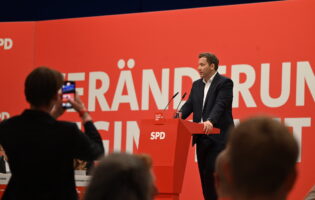
@alternativefuerde on Facebook
The Alternative für Deutschland’s Embrace of Culture Wars

Ali Cain
Cardozo Law Institute in Holocaust and Human Rights
Ali Cain recently graduated from Columbia University with an MA in European History, Politics, and Society. Her MA thesis “State of Pandemic: Opportunity or Challenge to the Alternative für Deutschland Party?” analyzes the Alternative für Deutschland’s political strategy and social media communication during the pandemic. She currently works as the Program Coordinator at the Cardozo Law Institute in Holocaust and Human Rights.
Throughout the coronavirus pandemic, the Alternative für Deutschland party (AfD) has fanned the flames of anger toward Angela Merkel’s government. The party criticized the chancellor’s lockdown policies, rallied against mask-wearing, and ridiculed those taking the pandemic seriously, arguing they were victims of Corona-Hysterie. When looking at the AfD’s social media in 2020, culture war issues, including the politicization of the pandemic, became central to its political strategy. The party jeered the Black Lives Matter movement, vilified the media, and disputed climate change science. Greater inclusion of cultural grievances outside of migration into the AfD’s platform indicates its efforts to remain relevant during a crisis that increased support for the ruling government and decreased the prevalence of migration in national discussions.
A Party That Leverages Crises for Transformation
Like other populist parties, the AfD has undergone several phases of reinvention. Although it began as a Eurosceptic party in 2013, it leveraged the European migration crisis in 2015 to reinvent itself as the self-appointed defender of the German identity. When comparing the Party’s 2013 and 2017 campaign manifestos, its shifting of priorities from fiscal conservatism and a German exit from the Eurozone to migration is evident. Whereas the AfD included only three bullet points about migration in its first manifesto, concerns over asylum seekers disrupting German culture, spreading Islam, and being violent criminals dominated six pages of its 2017 program. Its campaign posters exhibited xenophobia and Islamophobia in slogans like “New Germans? We’ll make them ourselves” and “Stop Islamization!” The party’s xenophobic rhetoric appealed to voters at a time when almost 70 percent of Germans identified migration as the most important issue. As a result, the AfD became the largest opposition party in the Bundestag in the 2017 election.
The Pandemic’s Impact on the AfD’s Priorities
Despite its successful 2017 campaign, the AfD’s popularity has been on the decline since 2019 as more voters return to the center. The pandemic has further challenged the party’s popularity as Merkel received her highest approval ratings ever during the pandemic’s peak in mid-2020. To expand its voting base, the AfD is once again transforming itself but this time as a party of culture wars. It is now heavily incorporating cultural grievances outside of migration in its efforts to appeal to voters. When analyzing its Facebook posts in 2020, three conclusions can be drawn:
The AfD adopted a similar approach as other far-right parties in politicizing COVID-19
Since the pandemic’s onset, the AfD has spread misinformation about the coronavirus and government policies. It created a narrative that the medical community cannot be trusted and that the ruling parties curtailed Germans’ constitutional rights with their COVID-19 policies. The party implemented an online campaign demanding that the German economy reopen and argued that the pandemic’s restrictions infringed on freedom of expression. The AfD encouraged the mass demonstrations in Berlin that led to an attempted storming of the Reichstag in August 2020. It further applauded countries that did not implement lockdowns like Sweden, questioned the science around mask wearing, and rallied against possible vaccine mandates. Its politicization of the pandemic illustrates a growing reliance on misinformation and language around fundamental rights as a political strategy.
The party continued to spread fear about refugees and migrants
Despite Germany and the EU’s borders being closed in 2020, the AfD maintained its xenophobic rhetoric around migration. Not only did the party advance its criticism of Merkel’s open border policy in 2015 but it manipulated new developments to incite fear of future influxes. For example, when fires occurred at the Moria refugee camp in Greece in September 2020, the AfD claimed that refugees purposely started the fires so they would be moved to Germany. After Merkel announced the acceptance of over 100 minors from Moria, the AfD warned of another massive migration wave. The party praised the Greek government for adopting harsher policies towards refugees, including forced returns, and criticized the European Commission’s New Pact on Migration and Asylum. Islamophobia was evident in the AfD’s posts on migration; when a French school teacher was murdered by an Islamic extremist in October 2020, the AfD manipulated the murder to paint all asylum seekers from the Middle East as dangerous. Its commentary demonstrates that the AfD still relies on fears and prejudices towards migrants as a tool for voter support.
The AfD followed other far-right parties in being angry about…. well, everything
Most striking about the AfD’s Facebook commentary during 2020 was how it adopted a right-wing approach to every hot-topic issue. After the murder of George Floyd in June 2020, the AfD berated Black Lives Matter, denied racism, and promoted a narrative of law and order. It presented ‘Antifa’ as a national security threat and connected Leftists to communists and the former GDR regime. Leading up to the anniversary of the Berlin Wall’s fall, the party began a campaign to invoke both historical memories of the Cold War and criticize the Merkel government for failing to address cultural and economic differences in former East Germany. The AfD also lambasted the media for unfair coverage, claiming that journalists purposefully misrepresented the party to hurt its electoral chances. It further attacked the government’s efforts to tackle climate change by criticizing new emissions regulations and mocked Swedish activist Greta Thunberg. The AfD’s absorption of these culture war issues into its platform displays that the party is riding the coattails of other far-right movements in invoking fears over loss of identity and anger over perceived ‘political correctness’ to grow its electorate.
The AfD’s Approach to the 2021 Election
Although the party’s popularity has decreased, its support remains at 10-11 percent. The AfD’s 2021 campaign slogan “Germany. But Normal” exhibits its shift to a party of culture wars. In inferring that Germany’s diversity, trust in science, and democratic society are not “normal,” the AfD reinforces its self-image as the protector of traditions and identity and challenger of the status quo. Its political priorities for the election, which include ending the lockdown, securing Germany’s borders, and increasing support for police and the military, reflect its efforts to incite cultural insecurities, anger, and more extreme attitudes to attract new voters. The pandemic remains Germans’ number one priority, and many still support the government’s lockdowns. Therefore, the AfD’s new strategy will be put to the test once the pandemic recedes and Germany actually returns to “normal.”









